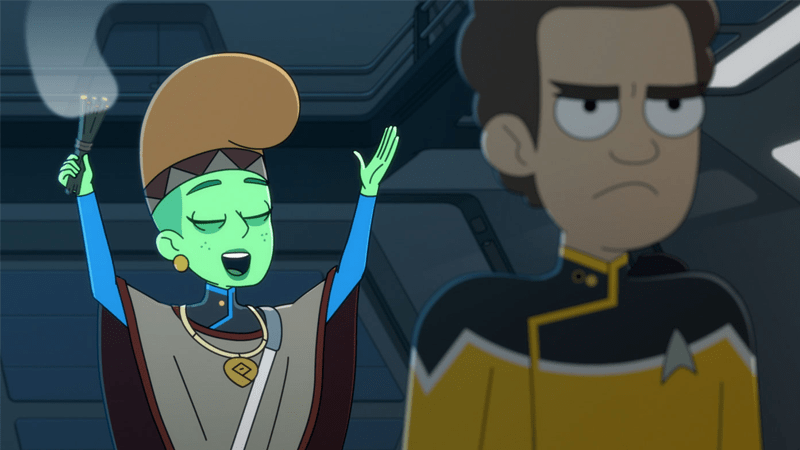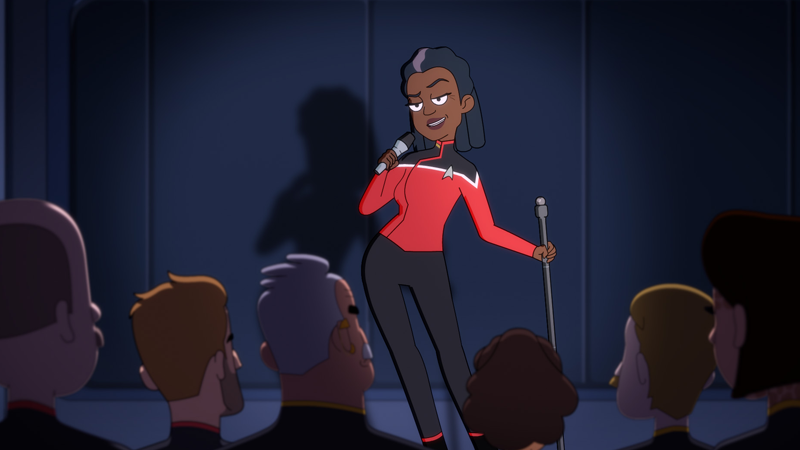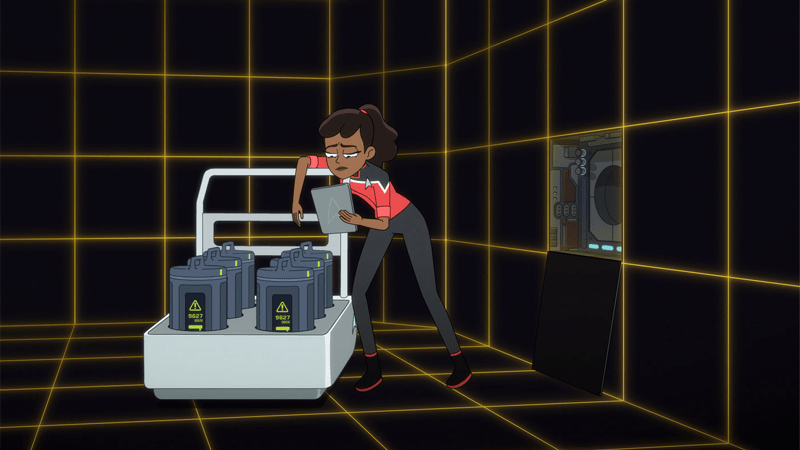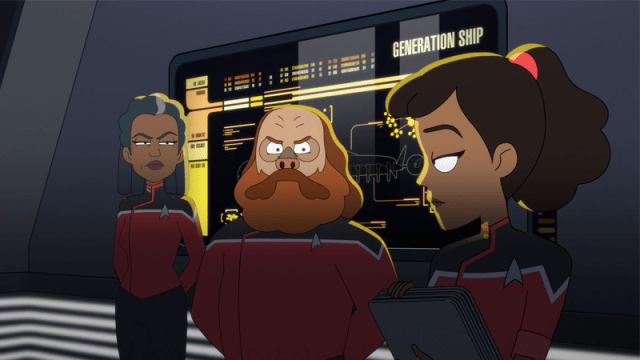Star Trek: Lower Decks is, in a lot of ways, not really like “Lower Decks,” the Star Trek: The Next Generation episode it is named for. But in between bouts of Trek-y silliness that have made the show so endearing so far, its fourth episode finally brings itself closer to its predecessor by delving into the series’ most interesting relationship.

“Moist Vessel,” unlike past episodes, really has three intersecting plots, two of which are the now-expected riffs on Star Trek classics. There’s the “serious” plot-of-the-week that saw the Cerritos assist the U.S.S. Merced in investigating a stranded, alien colony vessel filled with terraforming goop that Starfleet is very interested in. The sillier sub-plot to this is still very much in line with Star Trek pastiche, as Tendi finds herself accidentally messing up a fellow crewmember’s spiritual ascension, a hodgepodge of commentaries on the textual and metatextual relationship Trek has had with religions among Starfleet crews and the beings they encounter. But the most fascinating part of the episode is the real heart underneath these two: the relationship between Beckett Mariner and her mother Carol Freeman, the Cerritos’ captain.

Beyond the initial reveal in the premiere, Lower Decks has yet to really dive into the testy relationship between Mariner and her mother. While this episode tackles the personal disconnect between the two, it also uses it to examine something the original “Lower Decks” was also subtly fascinated by: the power dynamics between the senior officers of a Starfleet crew and the junior officers beneath them.
In The Next Generation episode, this was present in the mystery of the central plot, as Picard and the bridge crew of the Enterprise attempted to keep our Ensign heroes unaware that the ship was attempting to aid a Cardassian double agent on a secretive mission. It’s also there in more oblique ways — the power Picard and Worf wield over Ensign Jaxa under the guise of testing her capabilities for their mission, even in the gossip Troi and Crusher share about Ensign Ogawa’s romantic partner. Reframed from the perspective of these junior officers, instead of the lens we’re used to seeing in our Star Trek protagonists, this disparity between ranks doesn’t just become starker, it’s presented in a decidedly murkier light.
[referenced id=”1236992″ url=”https://gizmodo.com.au/2020/08/tngs-lower-decks-episode-is-a-perfect-peek-behind-star-treks-curtains/” thumb=”https://gizmodo.com.au/wp-content/uploads/2020/08/05/w14oqepns38mm3elzafy-300×169.png” title=”TNG’s ‘Lower Decks’ Episode Is a Perfect Peek Behind Star Trek’s Curtains” excerpt=”This week, Star Trek returns to the world of animation with Lower Decks, a new series dedicated to the motley officers who make up the bottom rungs of Starfleet’s finest. It’s a chance to goof on the series at large from the perspective of its unsung heroes — but going…”]
Lower Decks being what it is, before it examines that power in a more earnest manner, it takes a crack at a more jokey angle. When Ransom and Freeman first fail in their attempt to get Mariner off the Cerritos (without court martialling her, itself too overt a display of their power dynamic) by assigning her the grossest jobs — like cleaning out the holodecks after you-know-what — they then turn to an actual horror for the young Ensign: promoting her to the senior staff. Ensign Beckett Mariner becomes Lieutenant Beckett Mariner.
Yes, it’s treated as a joke at first, Mariner finds herself more despondent about away mission briefing audits and the true nightmare that is senior officer open mic night and poker (do Starfleet officers…know other card games?) than she is scraping carbon off of a carbon filter. But even then, the disparity between what is presented as “hell” for an executive officer (bureaucracy, mandatory recreational activities) and “hell” for their juniors (cleaning the [bleep!] out of the [bleep!] filter, as Ransom accidentally yells at one point) speaks to the inherent power on display on every Starfleet vessel, whether it’s one as important as the Enterprise or one as…less important as the Cerritos.

Eventually, “Moist Vessel” tackles it more seriously, as Beckett calls out her mother for the flagrant abuse of her captaincy and, at the most inopportune time, everything aboard the alien ship and the Merced goes haywire thanks to the jealousy of its own captain, Durango (power dynamics: not just a thing between senior and junior staff!). As terraforming fluid wrecks both ships, Mariner and Captain Freeman have to put aside their relationship and the power disparity between them — both as Captain and Lieutenant as well as mother and daughter — to save themselves and the ship. But crucially, Captain Freeman can’t: even as Mariner displays her passion and capability as an officer, she continues to harangue and second-guess her daughter’s decisions in a moment of crisis.
It takes Mariner making this power disparity clear — that her mother is being grossly in the wrong for trying to not just micro-manage her daughter, but abuse her power to force a passionate officer off her crew — for Freeman to step back and really see that her daughter is good at what she does, even if she acts out while doing so. By letting her do her thing, the two save the Cerritos and the Merced’s crew, and at long last, come to a better understanding of each other.

Beckett might not be able to resist committing one more act of self-sabotage to be back in the lower decks where she belongs, but it becomes clear that her relationship with her mother (outside of the immediate moment of Captain Freeman being incensed at looking like a fool in front of an admiral) is in a better place. The power disparity between upper and lower decks might always be there, but the one between a helicopter mum and her anti-authority daughter doesn’t have to be.
[referenced id=”1264822″ url=”https://gizmodo.com.au/2020/08/star-trek-lower-decks-tackles-one-of-starfleets-oldest-funniest-questions/” thumb=”https://gizmodo.com.au/wp-content/uploads/2020/08/20/nbvkwsspssnop0n0961w-300×169.png” title=”Star Trek: Lower Decks Tackles One of Starfleet’s Oldest, Funniest Questions” excerpt=”We all have questions about some of the banal things that happen on Star Trek ships. One I’ve always loved thinking about the most is that interplay when an officer asks somehow how long it’ll take do some technobabbley thing, and they reply that it’ll take hours. Why does it…”]
